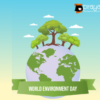10th October: World Mental Health Day
World Mental Health Day is observed on 10 October every year, with the overall objective of raising awareness of mental health issues around the world and mobilizing efforts in support of mental health.
Mental health is a hot topic. This is good news. It means the stigma for mental health issues is slowly going away. Mental health issues are finally getting the attention they deserve. Healthcare workers and individuals feel they can discuss mental health more openly. However, that doesn’t mean there isn’t still work to do, however.
2020 theme “Mental Health for All: Greater Investment
2019 Theme “Working Together to Prevent Suicide”
When one has poor mental health, they are more likely to suffer from a mental health disorder. These disorders include the following diagnoses:
- Depression
- Generalized Anxiety Disorder (GAD)
- Panic disorder
- Phobias
- Social Anxiety Disorder (SAD)
- Obsessive-compulsive Disorder (OCD)
- Post-traumatic Stress Disorder (PTSD)
Of these mental health disorders, most people experience anxiety disorders. Statistics show about 4% of the world’s population has a form of anxiety disorder. In the United States, the percentage increases to just over 18% of the population.
The World Federation for Mental Health organizes World Mental Health Day. Each year, a variety of events are held all around the world to increase awareness about mental health issues. Events include educational seminars, free mental health screenings, walk-a-thons, marathons, conferences, mass media promotions, and public service announcements.
This year’s World Mental Health Day, on 10 October, comes at a time when our daily lives have changed considerably as a result of the COVID-19 pandemic. The past months have brought many challenges: for health-care workers, providing care in difficult circumstances, going to work fearful of bringing COVID-19 home with them; for students, adapting to taking classes from home, with little contact with teachers and friends, and anxious about their futures; for workers whose livelihoods are threatened; for the vast number of people caught in poverty or in fragile humanitarian settings with extremely limited protection from COVID-19; and for people with mental health conditions, many experiencing even greater social isolation than before. And this is to say nothing of managing the grief of losing a loved one, sometimes without being able to say goodbye.














 We can help you.
We can help you. 




